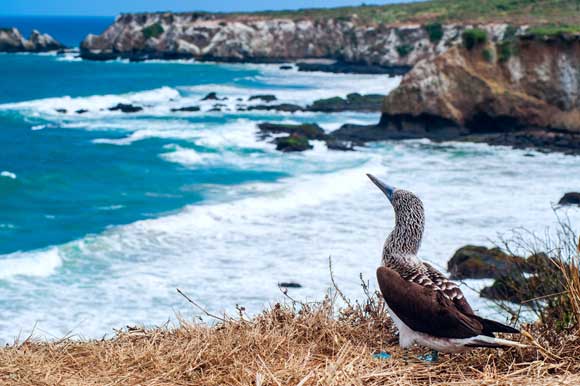Sandra M. Says:
I like the idea of moving to Ecuador. I’ve always been fascinated by the Galapagos Islands and the sheer variety of wildlife in the country. If I were to move there (not the islands but mainland Ecuador) would there be much opportunity to volunteer to work with wildlife, especially marine animals?
IL Ecuador Correspondent Donna Stiteler Says:
 The coast of Ecuador has some of the most prolific marine life in the world, including the Galapagos Islands as you say. Because of this, there are several marine biologist sites to explore everything from seal and whale migration, to the unique birdlife in the marine environment, sea… like the blue footed booby.
The coast of Ecuador has some of the most prolific marine life in the world, including the Galapagos Islands as you say. Because of this, there are several marine biologist sites to explore everything from seal and whale migration, to the unique birdlife in the marine environment, sea… like the blue footed booby.
Pacific Marine Research offers volunteer opportunities through the Yanapuma Foundation by applying here.
According to their website, “Yanapuma is an international organization working in the area of marine research, education and conservation to address the issues that shape the future of our oceans and our planet. In Ecuador the Foundation is based on the central Pacific coast in Puerto Lopez, where for three months of the year migrating whales pass close to the shore.”
The seaside town of Puerto Lopez (population 8,000) is located midway up the Ecuadorian Pacific coast and near the Isla de La Plata, renowned for its biodiversity and wildlife, and the greater Machililla national park. I’ve been to both places and the guides who explain the wildlife are incredibly informative. Plus, there are lots of ongoing studies about all types of wildlife which involve volunteers by other organizations operating out of Puerto Lopez or Olon.
Also included on their website is the areas they are involved in as follows:
Marine research—including studies of humpback whales in Hawaii, Australia, Tonga, Alaska, Japan and Ecuador, along with pioneering studies of the wild dolphins and coral reefs of Maui County
Education—the Foundation’s award-winning marine education programs grew out of a desire to share research discoveries with the public. These programs combine field trips and classroom/lab work, aiming to inspire greater interest in science and marine conservation. The foundation also offers talks, slideshows, displays and educational guides for the public.
Conservation – tackling issues ranging from small to large, from preventing litter on beaches to stopping commercial or so-called “scientific whaling” around the world.
Because of its environmental diversity, there’s lots of attention to Ecuador in its natural environments. You will fit right in.

